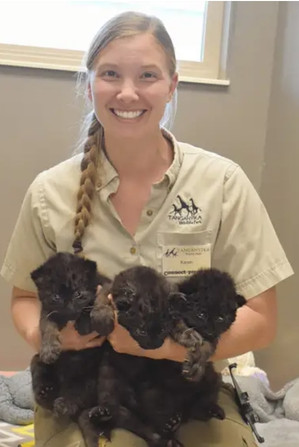Tanganyika Wildlife Park shuts down splash park after more than a dozen visitors become ill
- Roadside Zoo News

- Jun 20, 2021
- 3 min read

Tanganyika Wildlife Park has temporarily shut down their Tanganyika Falls Splash Park after numerous visitors became ill.
Tanganyika Wildlife Park calls itself a sanctuary but it is one of the nation’s most prolific breeders of exotic animals, which they steal from their parents to imprint on and use in pay-to-play encounters.
In Aug. 2020, Tanganyika Wildlife Park opened a 5,000 square foot splash park inside their roadside zoo to draw in additional revenue. The splash park reopened for the 2021 season on May 31.
More than a dozen adults and children who have visited Tanganyika Falls since it reopened have reportedly become sick with symptoms such as fever, vomiting and diarrhea. Two children became so sick after visiting that they have reportedly been hospitalized.
Yesterday, Tanganyika Wildlife Park made a Facebook post announcing the splash park was temporarily closed.
“The filtration system is giving us problems and we are working diligently to remedy the issue,” Tanganyika Wildlife Park said. “The splash park is a new adventure for us animal people and it was an issue we could not foresee. We plan to notify everyone as soon as we have a set date for opening.”
Numerous people took to the comments section to air their grievances about Tanganyika’s lack of transparency for the real cause of the splash park closure. Several commenters said their entire family became sick after visiting the splash park.
It is believed visitors to the splash park are getting sick due to a parasite, virus or bacteria in the water. Cryptosporidiosis, norovirus and E coli are germs that commonly cause recreational water illness outbreaks, according to the Centers for Disease Control.
Today, Tanganyika Wildlife Park Director Matt Fouts made another post updating followers about the splash park situation.
“I was notified late Friday afternoon by the county health department with some concerns of a possible connection of illness, and they wanted to take water samples,” Fouts said. “After further discussions with the health department toward the end of the day Saturday I chose to voluntarily (and temporarily) close the splash park until I could ensure the safety of the visitors.”
Several people pointed out the risks of having a splash park inside a roadside zoo.
“Cross contamination from animal feces could easily occur without a stretch of the imagination and spread a zoonotic infection,” one commenter said.
Another commenter said having animals near a splash park was the worst possible idea.
“A water filtration system will do nothing for animal feces on your shoes, stroller wheels, clothing that you carry from the ‘petting/feeding’ area straight to the water system," she said. "Bad move on Tanganyika!”
Several commenters also chastised Tanganyika Wildlife Park for their animal care.
“Tell you what else is a bad move, the tiny cages they keep these poor animals in,” a visitor said. “Not to mention the cubs they are bottle feeding for ‘rehabilitation.’ I call bullshit on them rehabilitating any animal.”
Another commenter said anyone who visits a splash park at a roadside zoo should expect to get sick.
“This is what happens when a subpar roadside attraction that can’t even meet AZA accreditation standards [opens a splash park] and you expect them to keep your water safe?” the woman questioned. “Their goal is money. Green, cold, hard, money. Your sick kids mean nothing to them except money lost. Give your money to reputable places. And I truly hope you all sue them into bankruptcy. The animals and this community would be a lot better off.”
%20(1).png)









Comments